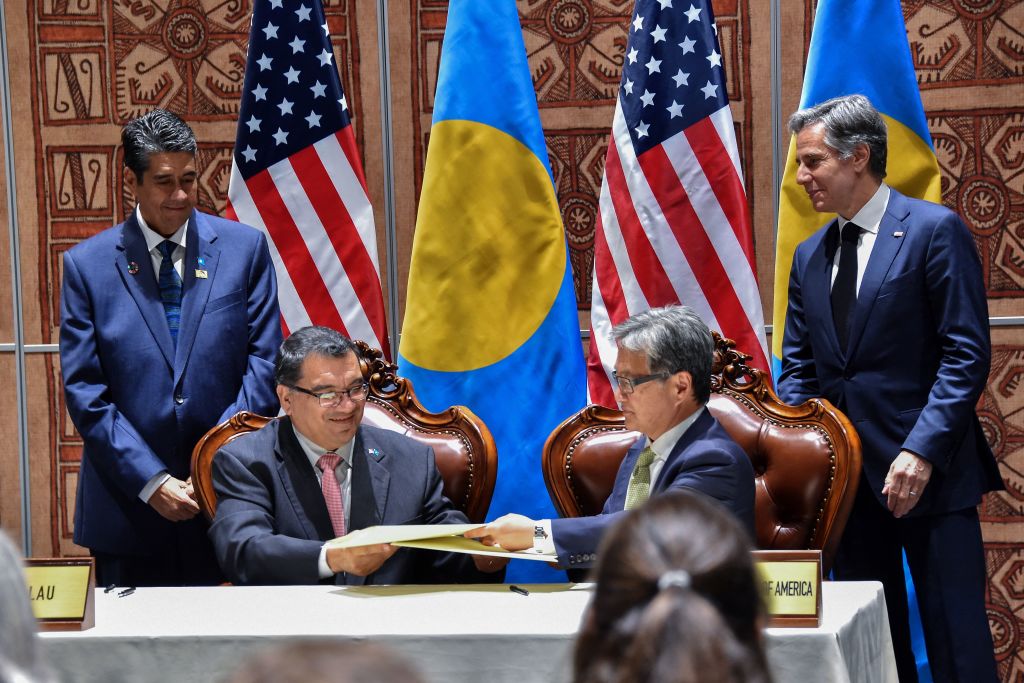Micronesia as headline fodder in the US–China contest

In the context of world events, an announcement that US President Joe Biden would sign agreements with Pacific island nations may not seem to be headline news. However, when those agreements are framed as a counter to China, many pay attention. Events in the Pacific islands region these days are analysed for how they contribute to great-power politics. For example, the US official announcing Biden’s plans later said that Washington ‘was playing … a little bit of catch-up’ in the diplomatic contest with Beijing.
The media headlines are closely following the ‘pushing back against China’ storyline. Observers characterised Biden’s planned trip to Papua New Guinea to sign agreements with Prime Minister James Marape and renew aspects of the Compacts of Free Association with Micronesian states as ‘nice work from the White House as it surrounds China’s upstart dictatorship in the Solomons’. But while the PNG security agreements had some novel aspects, the Micronesian compacts got lumped in with them, even though the security portions of the compacts were not the direct subject of negotiation.
Praising the signing of ‘security pacts’ with Micronesia is a celebration of deeds already done. There was really nothing new. What does it say about the media’s narrative on US–China competition when old news is news?
Each of the Freely Associated States of the Pacific—the Federated States of Micronesia, the Republic of the Marshall Islands and the Republic of Palau—has had a Compact of Free Association with the US for at least 30 years. Under the agreements, the COFA states delegate to the US government ‘full authority and responsibility for security and defense matters’, including the establishment of bases (and the denial to others of the right to do so).
These security and defence rights were not the ‘agreements’ being talked about in the recent counter-Chinese narrative. The arguably irrevocable US defence prerogatives are the basis of the US interest in the COFA states. But the excessive self-congratulations about an agreement to counter China occupied only media space, since the US already occupies the legal space that gives it access to the COFA states.
The agreements that were to be signed by the US and COFA representatives in May were formalities related to existing arrangements. Memorandums of understanding had been entered into in February and the specific agreements to be signed had been initialled by US and Marshall Islands negotiators earlier in the week (and for Palau a week later). All the discussion about ‘security pacts’ to be signed was more about headline fodder for the US president’s planned visit to the Pacific than it was a substantive security watershed. (In the end, the debt crisis in the US forced Biden to cancel his trip to PNG, and Secretary of State Antony Blinken went in his stead.)
The nature of the agreements belies the fragility of the tale being spun. They are not about blunting China, but rather the amount of compensation the US will provide to the COFA states. In short, what is at issue is the level of economic support the US will extend to COFA states over the next 20 years.
Not insignificantly, the US government has served as the senior partner in a ‘privileged relationship’ with the Micronesian states for more than 75 years. Over this period, the development outcome for the Micronesian states has been less than optimal. The World Bank has listed the Federated States of Micronesia and Marshall Islands as two of six Pacific island states at high risk of debt distress, and all three COFA states have long been identified by US government auditors as dependent on US assistance for the limited program budgets they provide their citizens.
Make no mistake, these new agreements are a big deal to the COFA states. They need the support. But the signed agreements do not guarantee the monies. They merely establish a baseline that the US executive branch has submitted to Congress for approval and appropriation. In this regard, the agreements are a handoff to a body whose recalcitrance on the matter of US debt sidelined the president himself from attending the signing in PNG. Time will tell whether Congress acts positively on these agreements.
The basic context surrounding the COFA states underlines the need for the media to look beyond government releases or official statements. The storyline of a ‘free and open Indo-Pacific’ drowns out important details that are central to understanding what is actually happening in Oceania. As a result, a narrative focused on ‘security’ dominated the news cycle. Most importantly, it masked the essential point: the renewal of key US economic support for the COFA states is still a long way from being realised.
The false ‘security’ narrative perpetuates an experience that island states know too well. Being treated as pawns is what many in the Pacific expect from global powers. If, however, the struggle between great powers is really about the ideas of rule of law versus authoritarianism, Pacific island nations deserve better than being treated as headline fodder.
The question the media needs to answer on US–China competition is whether the treatment of ‘the least of these’ is a harbinger for us all.